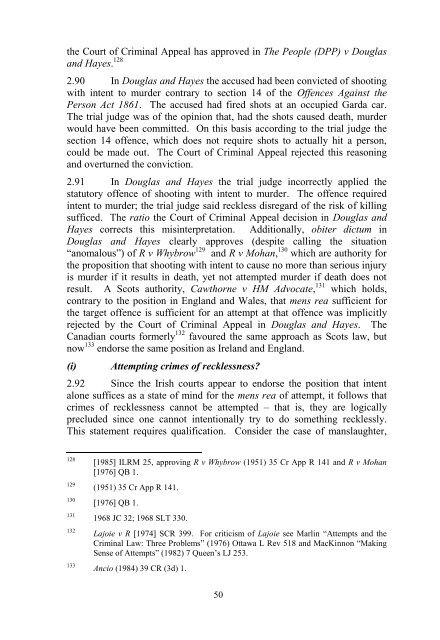Consultation Paper on Inchoate Offences - Law Reform Commission
Consultation Paper on Inchoate Offences - Law Reform Commission
Consultation Paper on Inchoate Offences - Law Reform Commission
Create successful ePaper yourself
Turn your PDF publications into a flip-book with our unique Google optimized e-Paper software.
the Court of Criminal Appeal has approved in The People (DPP) v Douglasand Hayes. 1282.90 In Douglas and Hayes the accused had been c<strong>on</strong>victed of shootingwith intent to murder c<strong>on</strong>trary to secti<strong>on</strong> 14 of the <strong>Offences</strong> Against thePers<strong>on</strong> Act 1861. The accused had fired shots at an occupied Garda car.The trial judge was of the opini<strong>on</strong> that, had the shots caused death, murderwould have been committed. On this basis according to the trial judge thesecti<strong>on</strong> 14 offence, which does not require shots to actually hit a pers<strong>on</strong>,could be made out. The Court of Criminal Appeal rejected this reas<strong>on</strong>ingand overturned the c<strong>on</strong>victi<strong>on</strong>.2.91 In Douglas and Hayes the trial judge incorrectly applied thestatutory offence of shooting with intent to murder. The offence requiredintent to murder; the trial judge said reckless disregard of the risk of killingsufficed. The ratio the Court of Criminal Appeal decisi<strong>on</strong> in Douglas andHayes corrects this misinterpretati<strong>on</strong>. Additi<strong>on</strong>ally, obiter dictum inDouglas and Hayes clearly approves (despite calling the situati<strong>on</strong>“anomalous”) of R v Whybrow 129 and R v Mohan, 130 which are authority forthe propositi<strong>on</strong> that shooting with intent to cause no more than serious injuryis murder if it results in death, yet not attempted murder if death does notresult. A Scots authority, Cawthorne v HM Advocate, 131 which holds,c<strong>on</strong>trary to the positi<strong>on</strong> in England and Wales, that mens rea sufficient forthe target offence is sufficient for an attempt at that offence was implicitlyrejected by the Court of Criminal Appeal in Douglas and Hayes. TheCanadian courts formerly 132 favoured the same approach as Scots law, butnow 133 endorse the same positi<strong>on</strong> as Ireland and England.(i)Attempting crimes of recklessness?2.92 Since the Irish courts appear to endorse the positi<strong>on</strong> that intental<strong>on</strong>e suffices as a state of mind for the mens rea of attempt, it follows thatcrimes of recklessness cannot be attempted – that is, they are logicallyprecluded since <strong>on</strong>e cannot intenti<strong>on</strong>ally try to do something recklessly.This statement requires qualificati<strong>on</strong>. C<strong>on</strong>sider the case of manslaughter,128129130131132133[1985] ILRM 25, approving R v Whybrow (1951) 35 Cr App R 141 and R v Mohan[1976] QB 1.(1951) 35 Cr App R 141.[1976] QB 1.1968 JC 32; 1968 SLT 330.Lajoie v R [1974] SCR 399. For criticism of Lajoie see Marlin “Attempts and theCriminal <strong>Law</strong>: Three Problems” (1976) Ottawa L Rev 518 and MacKinn<strong>on</strong> “MakingSense of Attempts” (1982) 7 Queen‟s LJ 253.Ancio (1984) 39 CR (3d) 1.50
















